Black History Month: Where to dine at Black-owned restaurants in Central Jersey
February is Black History Month, an opportunity to celebrate Black heritage. However, these Central Jersey restaurants celebrate that rich culture the other 11 months of the year, too.
These Black-owned spots in the diverse Central Jersey restaurant scene, which range from Haitian cafes to upscale Nigerian eateries, are delicious enough to add to your regular repertoire.
If you want to take a bite of authentic soul food favorites like collard greens or West African staples like jollof rice, head to these restaurants that offer a taste of history and teach you about a heritage that deserves celebration.
Soul food: Top Knotch Soultry Delights, Union

Vanetta Cherilien remembers being able to smell her grandmother’s kitchen long before she could see it.
Every Sunday after church, she and her family, which have Southern roots in Georgia, would gather at her grandmother’s home for a Sunday dinner of Southern comfort eats like macaroni and cheese, collard greens, fried chicken, cornbread sage stuffing and sweet potato pie. The tantalizing smells hit her on the sidewalk.
“I would watch her snipping beans, peeling yams and cutting collard greens, looking at all of this colorful raw food and how it became this blended fusion of smells,” Cherilien said.
Now, Cherilien’s the one who does the snipping, peeling and cutting at her five-year-old restaurant Top Knotch Soultry Delights in Union.

Its menu features those dishes Cherilien grew up learning alongside her grandmother, as well as her mother, who still cooks them with her today as the restaurant’s co-owner and sous chef.
At Top Knotch Soultry Delights, Cherilien uses her grandmother’s recipes, with her own twists and upscale plating. Her macaroni and cheese, which she deems the “best in town,” has a kick to it, unlike traditional macaroni and cheese.
“Some of our customers come here just for that,” Cherilien said.
Plus, to accommodate dietary restrictions, Top Knotch Soultry Delights’ collard greens are made with smoked turkey rather than ham hocks.
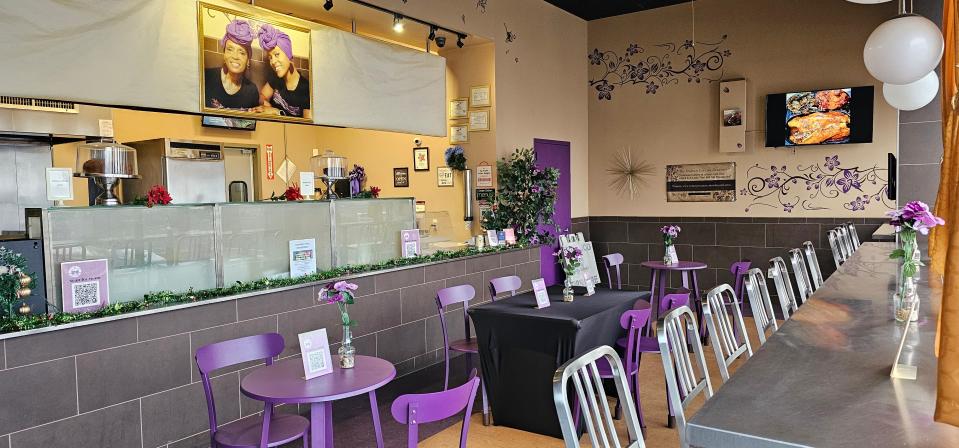
“Most people can’t even tell,” Cherilien said.
The comfort eats are served in a cozy, 20-seat space outfitted with purple accents. “We want to bring that Sunday dinner feel of the African-American community into the restaurant so people can eat it on a daily basis, and not wait for a Sunday,” Cherilien said.
Despite Cherilien’s soul food skills, when she was a little girl at her own family’s Sunday dinners, being a Black female chef felt far off.
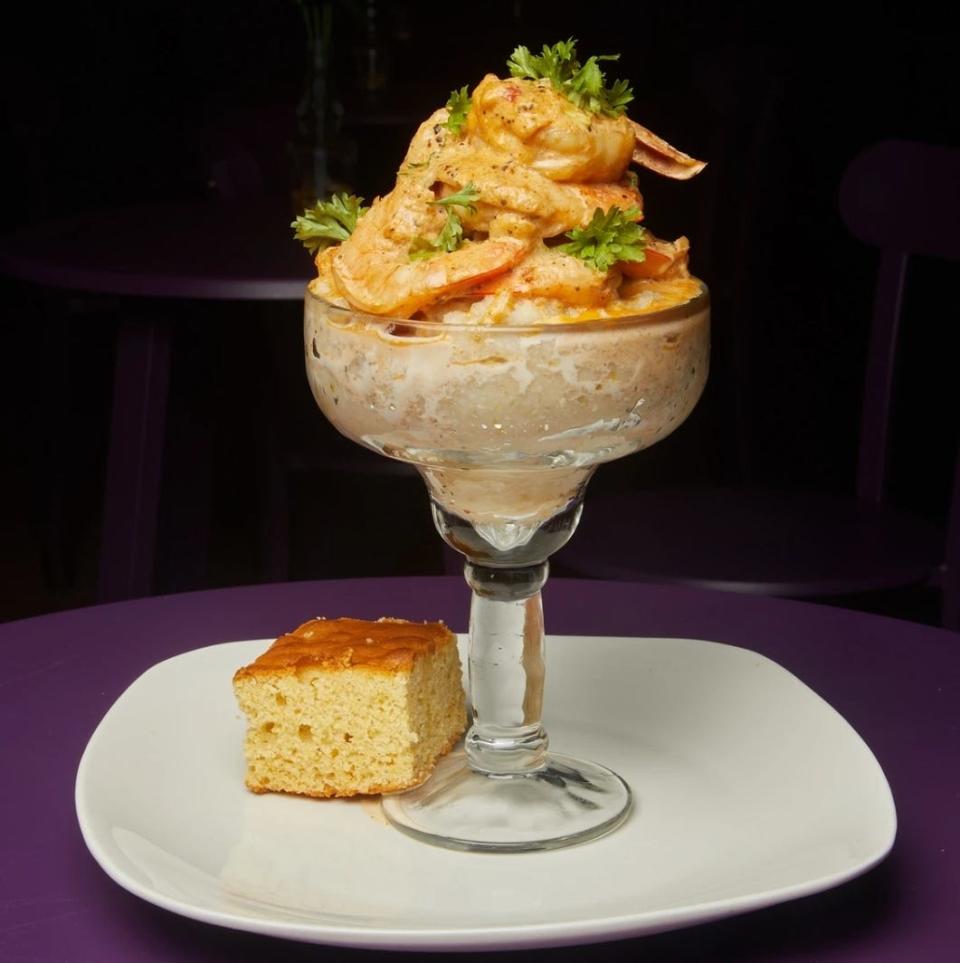
“When you hear of a chef, you think of a tall white man with a big chef’s hat on so that’s what I would see when I was younger,” she said. “It wasn’t until I got into the business of cooking that I realized how many different ethnicities of chefs there are, with everyone from Italian to Vietnamese.”
Before becoming a chef, Cherilien was a vice president of a pharmaceutical company. She opened Top Knotch Soultry Delights as a catering side gig in 2011 and after eight years, decided to open a restaurant and take the plunge to leave her 9-5 job and cook full-time.
But long before that, she worked every possible position in a restaurant, Cherilien said, as a server to a sous chef. She was once the hostess at the Red Lobster in Union across the highway from Top Knotch Soultry Delights, creating a full-circle moment that Cherilien is reminded of every time she drives to work.
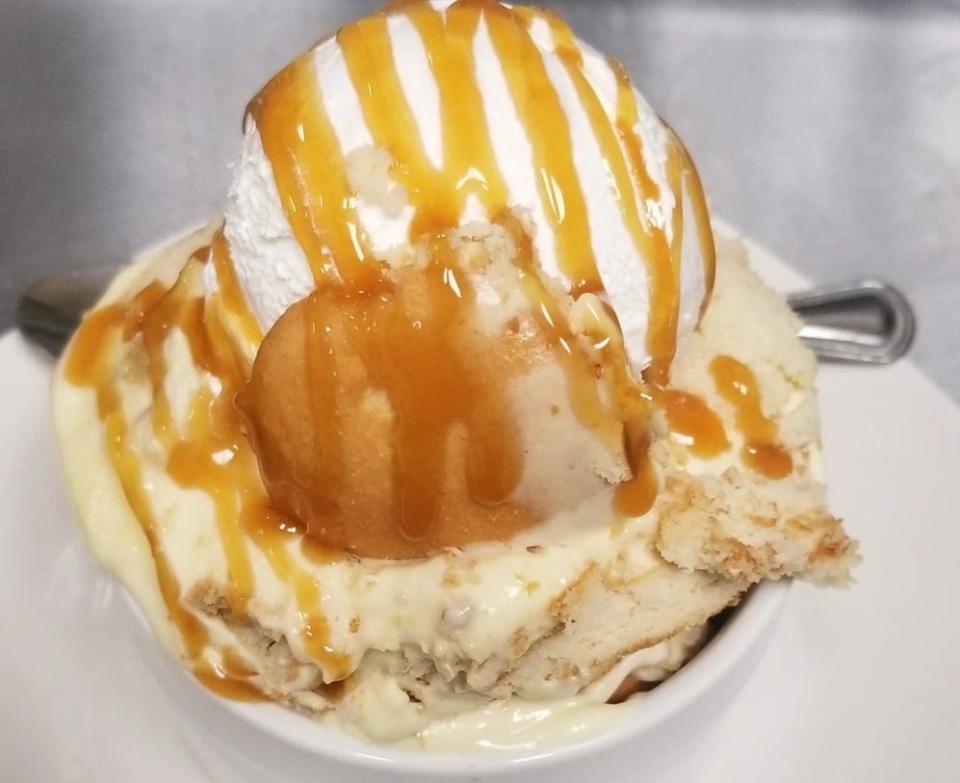
During Black History Month, Cherilien always receives requests from schools, companies and other organizations to present her soul food. She loves it.
“It gives people an opportunity to experience soul food hands-on, not just what they see on TV or what they heard about from a friend,” Cherilien said. “The best way to accept other cultures is to learn about them.”
Go: 2565 Route 22 Unit C, Union; 732-424-6404, topknotchsoultrydelights.com.
West African cuisine: Olaide's Kitchen, Parlin section of Sayreville

With orange patterned wallpaper made by a Black-owned business, Nigerian paintings and colorful, finely-plated Nigerian cuisine, Olaide’s Kitchen in the Parlin section of Sayreville is a love letter to both chef and owner Olaide Tella’s Nigerian upbringing and more than two decades of work.
“People see that we opened in 2017, but they don’t see the 15 years prior spent creating contacts through our catering business,” said director of operations Abigail Lemo, who immigrated to the United States with her mother, Tella, and her siblings from Nigeria in 1998. “When you’re a Black immigrant, you’re starting from scratch.”
But those decades have paid off for Tella, as Olaide’s Kitchen is a 30-seat modern West African restaurant featuring dishes like efo elegusi, which is kale and melon seed stew cooked in palm oil; and dried catfish sauteed in tomato-based stew.
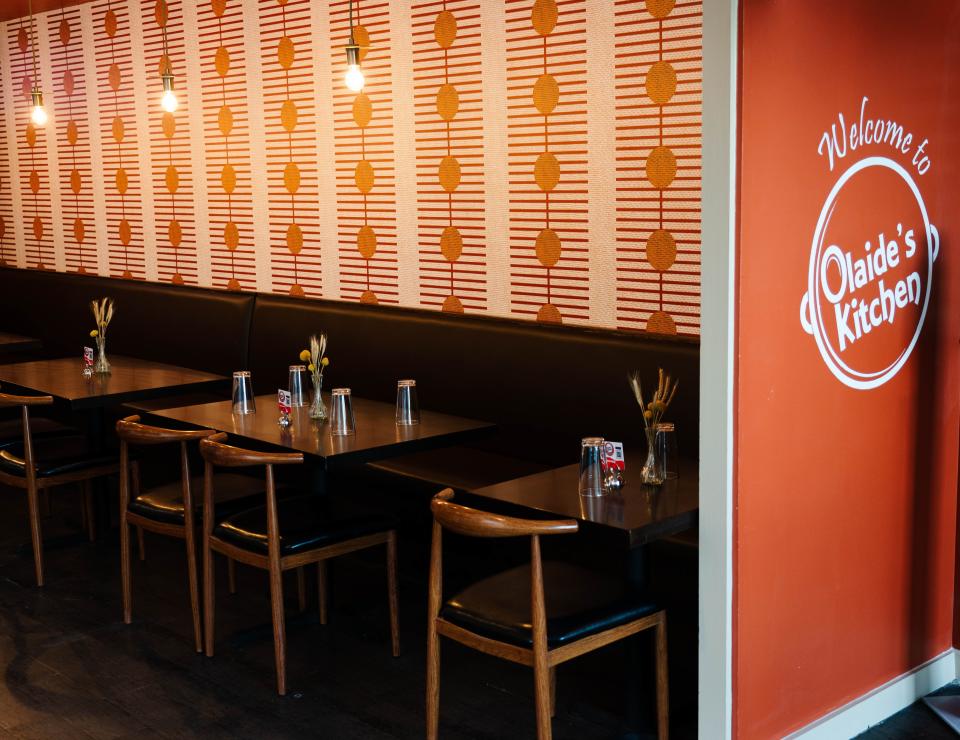
Ethnic eats: Where to taste the foods of the African diaspora in New Jersey
It’s a far cry from Tella’s mother’s buka, a Nigerian streetside restaurant with three seats, but it was also the foundation of her cooking prowess. Tella also attended a vocational culinary school in Nigeria.
Jollof rice, rice cooked in tomato sauce with spices, is one dish at Olaide’s Kitchen which Lemo vividly remembers eating at every party and special event when she was growing up in Nigeria.
“It’s made in a big pot so when you’re cooking it, it will burn and have a smoky flavor.” Lemo said. “If you don’t taste the smokiness, it’s not authentic jollof rice.”

Olaide’s Kitchen even used jollof rice to create a birthday cake for a customer who doesn’t like traditional cake. It’s one of the ways that Tella uses modern techniques to elevate her traditional cuisine.
Since about a third of Olaide’s Kitchen customers are not African, that’s also one way that Tella encourages customers to try dishes they’re not familiar with.
Plus, Lemo said, all servers are well-trained to help customers choose the best menu items for their palates, and also explain spice levels when necessary.
“The same way you boil an egg in Africa is the same way you boil an egg in America,” Lemo said. “We are making West African food like your mom makes it, but you’re not eating it in your mom’s kitchen – you’re eating it in a beautiful place.”
Go: 499 Ernston Road, Parlin; 732-952-8880, olaideskitchen.com.
Haitian cuisine: Estime's Cafe, Colonia section of Woodbridge
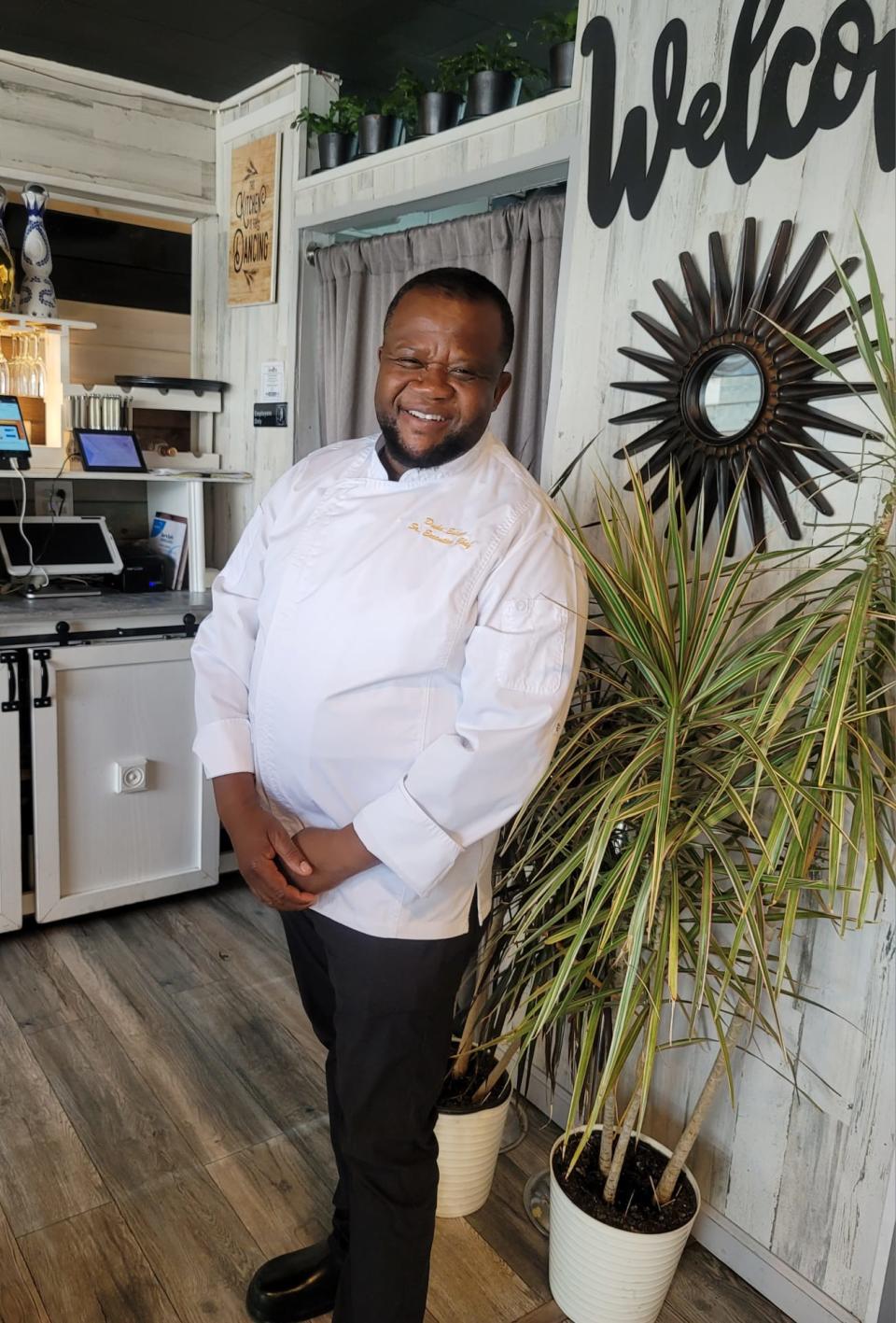
Growing up in Haiti, Duke Estime remembers being spellbound by his mother’s passed-down tale about soup joumou, a Haitian beef and vegetable soup on the UNESCO Intangible Cultural Heritage List.
For centuries, enslaved Africans in Haiti served the soup, a delicacy, to the French colonizers who ruled the country, despite being allowed to eat it themselves. But after Haiti won independence from France on Jan. 1, 1804, they were finally able to enjoy their fruits of their labors, including soup joumou.
Since then, Haitians have celebrated their Independence Day with heaping bowls of soup joumou. Estime serves it at his Haitian-inspired restaurant Estime’s Café in the Colonia section of Woodbridge every Dec. 31. But people of all nationalities enjoy the soup for Haiti's Independence Day and everyday.

Looking forward: We can't wait for these Central Jersey restaurants to open in 2024
“You never know who you’re going to see at my restaurant,” said Estime, who has owned Estime’s Café since 2018 and is opening a Caribbean fusion restaurant later this year in Carteret. “If you come here, I welcome you like you’re coming into my home.”
About half of Estime’s Café customers are Black, while the other half are people of other nationalities, Estime said, who are all interested in Haitian-influenced dishes like the Haitian spicy omelet with smoked herring, onions and peppers. It’s one of the best-sellers, as is the Haitian herring pasta with smoked herring and spaghetti.
“I have zero problem educating anyone about food,” Estime said. “My job is to make sure my guests are educated about different cultures.”
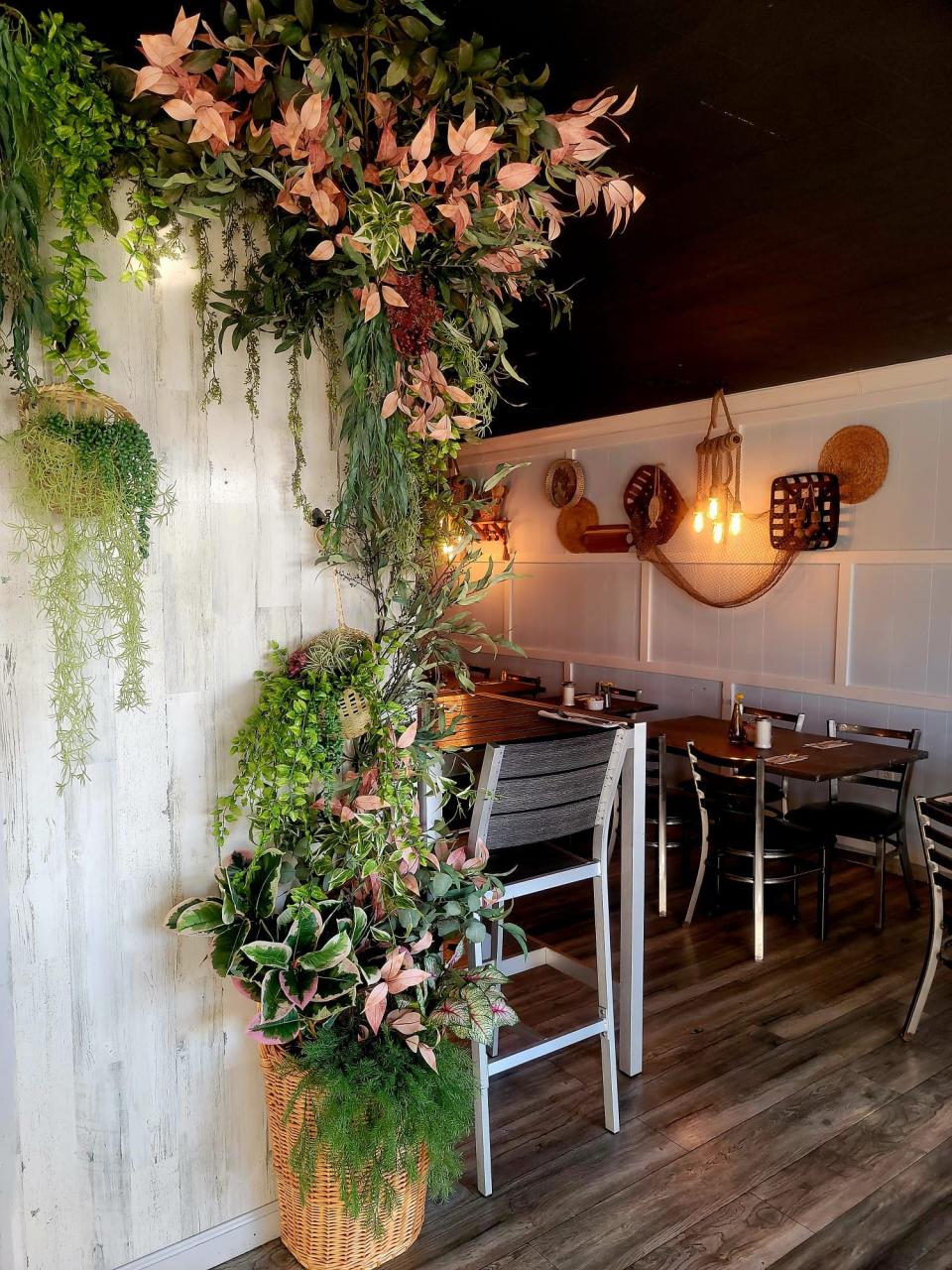
But instead of a classroom, customers learn about Haitian cuisine from Estime, who moved to the United States in 1989, in a cozy, 35-seat space lined with distressed wood, greenery and a breakfast bar.
The restaurant features a little bit of the many that Estime has worked at, such as Le Malt Lounge in Colonia and Xperience Kitchen & Cocktails in Avenel, combined with his Haitian background.
“Growing up and watching my mother cook, I always wanted to be in the kitchen,” Estime said. “I was always the guy who was at home cooking Sunday dinner.”
Go: 238 Inman Ave, Colonia section of Woodbridge; 732-669-7581, estimescafe.com.
Culturally-inclusive ice cream: The Urban Cone, Scotch Plains

At the Urban Cone ice cream shop in Scotch Plains, you won’t find flavors simply called mint chocolate chip, butter pecan or cake batter.
But you can choose from those like 1865, which is vanilla ice cream with Nutella and graham cracker crumbs; and BLM, which is chocolate ice cream with chocolate chips, chocolate sprinkles, Oreos and fudge.
“The Urban Cone highlights different cultures and also creates teachable moments,” said Dr. Jamar Q. Chiles, who opened the shop in 2022. “For example, someone can order the 1865 and when people ask what the name means, I can explain that 1865 was the year of the first Juneteenth.”
Chiles started the Urban Cone as an ice cream truck in 2020 which has grown into a fleet of trucks, one storefront and another opening in Garwood in April. A Black Essex County Sheriff’s officer, Chiles started the business in an effort to bring the community together during a time of turmoil.
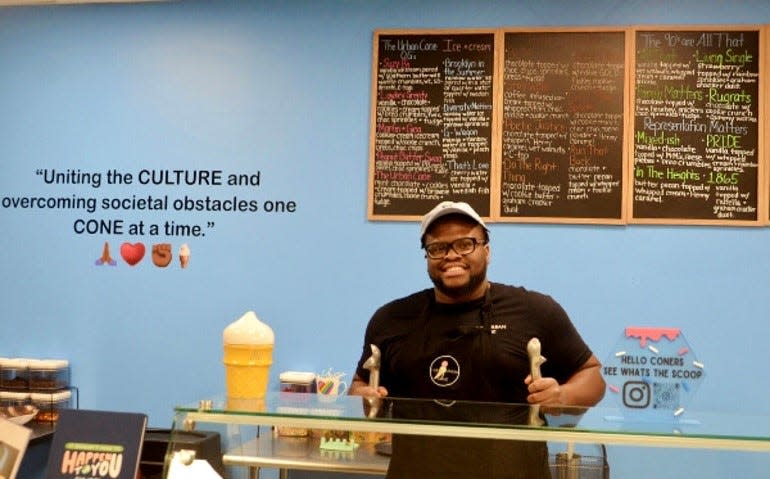
“Around that time, there was a lot of conflict between the Black community and law enforcement,” Chiles said. “I thought about what brings people together and makes them happy, and that’s ice cream. I figured if I could take this ice cream social concept and put it in a truck form, I could show the community a different side of police officers.”
The Scotch Plains shop seeks to do the same through its upbeat, pastel-colored interior with signs that say phrases like “Be Kind” as well as Pride flags.
The menu is inclusive, too. If the truck, which announces pop-up locations on social media, is heading to a Latin neighborhood for the day, it will offer dulce de leche or coconut ice cream, Chiles said. Or, if it’s going to a Caribbean neighborhood, it will feature flavors such as rum raisin or Jamaican grape nut.
As a result, the Urban Cone’s clientele is an even mix of cultures of backgrounds. Its trucks have visited more than 100 towns in the tristate area and served over 100,000 people.

Now that it’s Black History Month, Chiles is thrilled to celebrate yet another culture – his own.
“There were always Black influences in our cuisine and culture, but I’m glad that we finally live in a day and age where credit is being given to these pioneers of great flavors and ideas,” he said. “I think Black History Month is a great thing.”
Go: 1943 Route 22 Suite 2, Scotch Plains; 617-997-2966, theurbancone.com.

Contact: JIntersimone@MyCentralJersey.com
Jenna Intersimone has been a staff member at the USA TODAY NETWORK New Jersey since 2014, after becoming a blogger-turned-reporter following the creation of her award-winning travel blog. To get unlimited access to her stories about food, drink and fun, please subscribe or activate your digital account today. You can also follow her on Instagram at @seejennaeat and on Twitter at @JIntersimone.
This article originally appeared on MyCentralJersey.com: Black-owned restaurants to dine at in NJ for Black History Month

